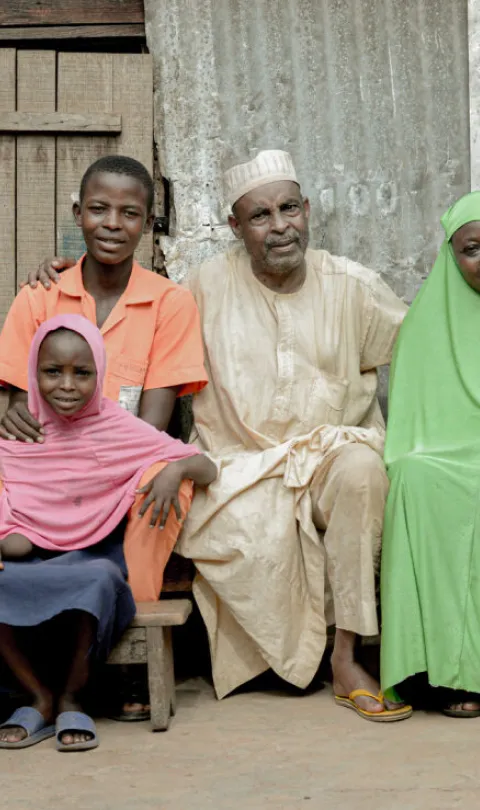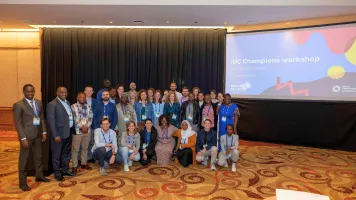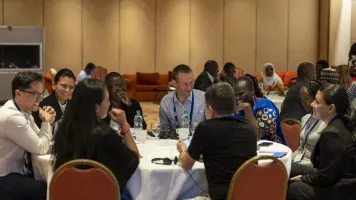Inclusive data is vital for achieving Sightsavers’ vision and mission, enabling us to better understand the people we work with, how they are marginalized, and the issues that prevent them from being included. Then, once we have that data, we can act to remove these barriers.
Sightsavers recently reaffirmed its commitment to advancing inclusive data by launching an updated Inclusive Data Charter (IDC) action plan. One of our IDC action plan objectives is to work with local, national, and global partners to increase their capacity to collect, analyze, and make use of inclusive data.
A great example of this in practice is a project I was involved in, in Cameroon, where we took a localization approach – and were blown away by the impact in the community. The approach involved working with local councils to collect disability disaggregated data and use that data to inform local development initiatives targeting people with disabilities.
As a result of this approach, we saw councils collaborating with people with disabilities for data uptake and use, and people with disabilities had more opportunities to enjoy their rights, reinforcing inclusive local development. Through this experience, we gained valuable insights, which others interested in this approach can benefit from.
Challenges to inclusive data localization in Cameroon
The decentralization law in Cameroon establishes provisions for local councils to drive local development and upholds the idea of public engagement in communal and regional action.
Despite the efforts of these 360 local government councils, data remains a fundamental barrier in informing local development planning, implementation, and monitoring.
As part of Sightsavers' social inclusion work in Cameroon, we worked with the Ministry of Social Affairs (MINAS) and the Ministry of Decentralisation and Local Development (MINDDEVEL) to assist local councils in ensuring that people with disabilities participate in local development processes within their communities.
To measure the impact and monitor the participation of people with disabilities in local development processes, disaggregated data was clearly required. Unfortunately, data collecting systems employed by local councils are frequently not disaggregated by disability, sex, or ethnicity, thus some groups are not counted and left out of decision making in local development.
In this context, Sightsavers implemented inclusive data pilot projects in two Cameroonian municipal councils: Maroua 1 and Nkoteng. The pilots were carried out from 2021 to 2022 in collaboration with local council authorities, local government ministry officials, and organizations of people with disabilities (OPDs).
The pilots used a bottom-up approach to intervention, with the intention of gathering evidence at the local level to use as tools to inspire national-level commitment on inclusive data.
Impacts of the inclusive data pilots
Strengthened capacity of local development partners
Local development stakeholders were trained on sustainable development and disaggregated data, including municipal councillors, regional government staff, and leaders of minority groups (people with disabilities, women, the elderly, and indigenous people).
Local councils were able to participate in the localization of the Sustainable Development Goals (SDGs) through a voluntary local review (VLR). Voluntary local reviews are reports published by local authorities to assess and present how the fulfillment of the 2030 Agenda is developing from a local standpoint (UN Habitat, 2020). The VLR conducted in the Maroua 1 council assessed progress towards reaching SDG 4 (Education) and SDG 10 (Reducing inequalities).
As a result, data collection tools designed by the national participatory development program and used by local councils were improved and reviewed to incorporate disability disaggregated data.
Improved access to services for people with disabilities
In Nkoteng, people with disabilities were identified in communities and informed about the laws around primary school education that enable parents with disabilities to send their children to school for free.
This was the case for Baba, who is a parent with a disability and father of two children, one of whom is a primary school age daughter. According to Baba, he had no money to send his daughter to school because he is retired, but thanks to the pilot project with the council, his daughter is now enrolled in primary school for free. Watch our new film highlighting the story of Baba from Nkoteng in Cameroon.
Enhanced partnerships between data stakeholders
The pilots revealed to the local government authorities that working with organizations of people with disabilities improves data collection and decision making. During field data collection, the local OPD in Nkoteng played an important role in facilitating access to the homes of people with disabilities and advised the council on the appropriate support to provide.
Organizations of people with disabilities also had the opportunity to update their databases on people with disabilities within their communities. As a result, OPDs had relevant evidence to inform their advocacy towards local decision makers and advocate for the people with disabilities identified to register as members of the OPD and support their efforts.
National level commitment to the IDC
As a result of the local level pilots, we were able to influence the engagement of the government at the national level. This led to MINDDEVEL signing up to the Inclusive Data Charter and committing to develop an action plan to scale up the inclusive data localization approach.
Lessons learned: Inclusive data drives more effective policies
The project was a vital driver of local development in these municipalities since it allowed local councils to better understand the needs of their constituents and respond appropriately. People with disabilities were able to demonstrate to the council that they are vital actors in local development and that they can also contribute to decision making.
Inclusive data not only informs policy development, but also ensures effective policy implementation.
- Boma Cliford Fosong, Sightsavers
I must acknowledge that trust between local development actors and organizations representing persons with disabilities was critical to the project's success. Given the pre-existing relationship between disability organizations and local councils, as well as Sightsavers' reputation as an organization promoting the rights of people with disabilities in Cameroon, local actors were confident and committed to the project.
The enabling policy environment in Cameroon equally contributed to the engagement of project stakeholders. More so, localization proved to be a driver for national commitment on inclusive data, as the local council pilot project contributed to the ministry of local development joining the Inclusive Data Charter.
Finally, this project reaffirms that inclusive data not only informs policy development, but also ensures effective policy implementation.
Read more about Sightsavers and inclusive data.



